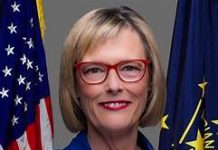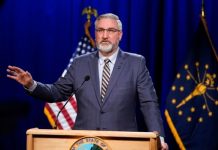COVID-19 Claims Third Hoosier As Officials Move To Delay May 5 Primary
Editor’s note: This story has been updated to include information about the third person in Indiana to die of COVID-19.
By Victoria Ratliff
TheStatehouseFile.com
INDIANAPOLIS—The Indiana State Department of Health announced late Friday afternoon that a third Hoosier has died of the novel coronavirus as state officials move to postpone the May 5 primary because of the fast-spreading outbreak.
The latest person to succumb to the virus is a Marion County adult over age 60 who had been hospitalized, according to the health department.
Growing concerns about how quickly the virus, also known as COVID-19, can be brought under controlled Gov. Eric Holcomb and Secretary of State Connie Lawson to announced Friday that they are asking the four-member Election Commission to delay the May 5 primary by one month to June 2.
Indiana would be joining seven other states in postponing a primary election because of the potential health threat to poll workers and voters.
“There are some other rules and regulations that will need to be modified to accommodate this election to further protect the health and safety and ability for people to vote under those circumstances,†Holcomb said.

The announcement about the primary came as the state saw its biggest surge in the number of cases. In addition to the death Friday of a Marion County adult, the Indiana Department of Health reported 23 news cases of the fast-spreading virus bringing the total number to 79. The majority of cases are concentrated in central Indiana.
The virus has resulted in drastic measures to limit its spread, including the closure of all schools and restaurants and bars being restricted to take-out service only.
Holcomb said all absentee voter rules should be suspended, and all Hoosiers should receive an absentee by-mail ballot. Current rules require that voters have a valid reason for voting by absentee ballot rather than in person at the polls.
Lawson said deadlines for military and overseas ballots were near approaching for the original May 5 primary date and counties needed more time to send them out.
“With multiple counties suspending normal business, we want to give clerks and election boards time to adjust,†she said.
That decision, however, is not up to Lawson or Holcomb but the Indiana Election Commission, which will hold a meeting Wednesday to discuss and possibly adopt the recommendations of Holcomb and Lawson.

The commission will also consider recommendations to accept all ballots with a May 5 date, allow family members to deliver absentee ballots to their loved one and allow county clerks to continually mail ballots from now through 12 days out from the new primary election date.
“We fully expect every Hoosier that wants to vote by mail in the June 2 primary, to be able,â€Â Democratic Party Chair John Zody said. “It will bring down barriers to the ballot box and throw open the door to free, fairer elections in the Hoosier state.â€
Indiana Republican Party Chairman Kyle Hupfer said changing the date was not something they took likely, but something they saw as a necessity.
“Moving to June 2 will provide for the safety and security of all involved in the election process and allow additional time for those tasked with the job of conducting the election to prepare,†he said in a statement.
Wednesday, Indianapolis Mayor Joe Hogsett announced that every resident of the city would receive an absentee ballot via mail because of the travel restrictions in Marion County.
“Moving forward, we must continue to prioritize the safety of Indianapolis residents and redouble our efforts to make the June 2nd primary election as accessible as possible,†he said in a statement Friday. “Our city’s ability to ensure that every resident can vote on Election Day is vital to the health of both our community and our democracy.â€
At the Friday press conference, Dr. Kristina Box, the state’s health commissioner, said the increase in the number of COVID-19 cases wasn’t surprising.
“As we start to test more, we’re going to get more positives. We expect that, so don’t be surprised by that,†she said. In all, 27 counties report cases of the virus.
Box said the state sent 200 tests to Eli Lilly Friday for testing and hopes to be able to send several hundred by the end of the weekend. She also said the state received protective gear from the federal government’s reserve and with the help of the Indiana National Guard and the state police the material is being delivered to hospitals and health departments across the state where they are needed.
“We are continuing to see a lot of Hoosier hospitality across the state,†she said. “I would ask you to continue to be good Hoosiers and check in on your neighbors, make sure that they’ve got what they need and continue to protect our elderly individuals.â€
Last week, Holcomb said he would call a special session for the General Assembly if needed, but that he felt confident that the state health department had the funding it needed.
Wednesday, Woody Myers a former State Health Commissioner and the Democratic nominee for governor said Holcomb should call the special session for legislators to pass paid sick leave requirements and money from the surplus to combat the effects of COVID-19.
Minority Leader Phil GiaQuinta, D-Fort Wayne, said he would support Holcomb’s decision on the special session but would prefer to work on solutions remotely.
“If there are ways that we could work together without having to call a special session, it is probably best,†he said.
FOOTNOTE: Victoria Ratliff is a reporter for TheStatehouseFile.com, a news website powered by Franklin College journalism students.







